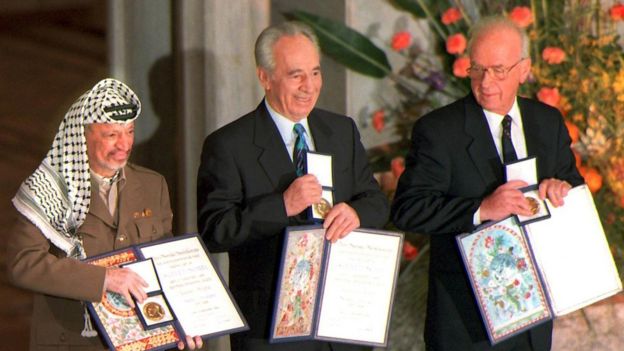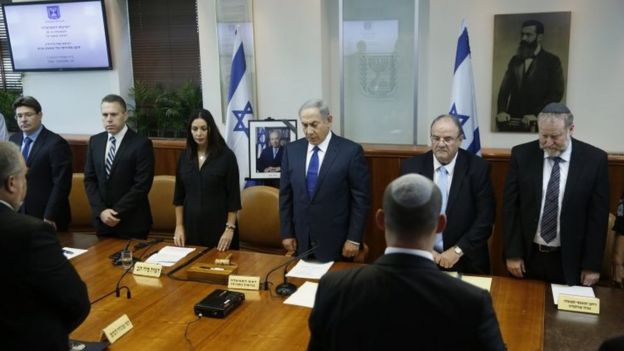
This article is more than
9 year old
Mr Peres suffered a stroke two weeks ago. His condition had improved before a sudden deterioration on Tuesday.
His son Chemi led tributes to "one of the founding fathers of the state of Israel" who "worked tirelessly" for it.
World figures are expected to attend his funeral in Jerusalem on Friday, including US President Barack Obama, Prince Charles and Pope Francis.
Mr Peres was one of the last of a generation of Israeli politicians present at the new nation's birth in 1948.
He won the Nobel Peace Prize in 1994 for his role negotiating the Oslo peace accords with the Palestinians a year earlier, a prize he shared with Prime Minister Yitzhak Rabin, who was later assassinated, and Palestinian leader Yasser Arafat.
He once said the Palestinians were Israel's "closest neighbours" and might become its "closest friends".

Mr Peres died in a hospital near Tel Aviv early on Wednesday, with his family at his bedside. He "left us without suffering", said Rafi Walden, his son-in-law and personal physician.
He had been in the intensive care unit of the Sheba Medical Centre after suffering a major stroke on 13 September.
The funeral will be held on Friday at Mount Herzl in Jerusalem, Israel's national cemetery.
Mr Peres's son, Chemi, said of his father: "He served our people before we even had a country of our own. He worked tirelessly for Israel from the very first day of the state to the last day of his life."
"My father used to say - and I'm quoting - 'You are only as great as the cause you serve,'" he added.
Israel's Prime Minister Benjamin Netanyahu expressed his "deep sorrow" over Mr Peres' death.
"As a man of vision, his gaze was aimed to the future," he said in a video statement.
"As a man of security, he fortified Israel's strength in many ways, some of which even today are still unknown.

"As a man of peace, he worked until his final days toward reconciling with our neighbours for a better future for our children.''
Meanwhile US President Barack Obama called Mr Peres his "dear friend" in a statement, and said: "He was guided by a vision of the human dignity and progress that he knew people of goodwill could advance together."
Palestinian Authority President Mahmoud Abbas sent a letter of condolence to Mr Peres' family "expressing his sorrow and sadness", a statement said.
"Peres was a partner in creating the peace of the brave with the late President Yasser Arafat and Prime Minister Rabin, and has made intensive efforts to reach a long-lasting peace since the Oslo agreement and until the last breath," it added.
But the militant Palestinian Islamist movement Hamas, which dominates the Gaza Strip, expressed happiness.
"Shimon Peres was one of the last Israeli founders of the occupation," spokesman Sami Abu Zuhri told the BBC. "His death marks the end of an era in the history of the Israeli occupation."
At the start of his long political career, he was put in charge of personnel and arms purchases for the Haganah, the predecessor of the Israel Defense Forces.
He secured a deal with France to supply the new Israeli nation with Mirage jet fighters. He also set up Israel's secret nuclear facility.
He was the defence minister in 1976, when Palestinian hijackers diverted a plane from Israel to Entebbe in Uganda. He oversaw the successful rescue of more than 100 hostages.
Once an advocate of Jewish settlements in the occupied West Bank, Mr Peres later became a leading political dove. He often spoke of the need for compromise over territorial demands in Palestinian areas.
He maintained an active public schedule into old age, mostly through his non-governmental Peres Centre for Peace, which promotes closer ties between Israel and the Palestinians.
In 2013, a year before stepping down as president, Mr Peres said: "There is no alternative to peace. There is no sense to go to war."